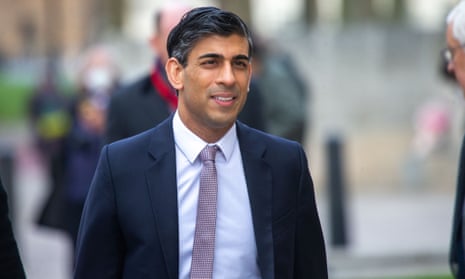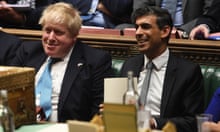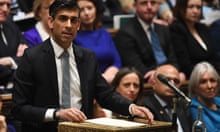Rishi Sunak is renowned at Westminster for his nice manners. One Conservative MP who lobbied the chancellor for a policy change, but came away empty-handed, says: “I have never been told to fuck off so politely.”
For a people-facing profession, politics is populated with many characters who have the people skills of a hippopotamus with toothache. In an environment where it is often absent, charm can take you a long way and it has been one of the key drivers of the sensationally swift ascent of the 41-year-old chancellor.
He looked close to reaching the very summit in the early part of this year when Number 10 was engulfed by the torrent of revelations about partygate. When asked whether he had confidence in Boris Johnson, some of his answers were studiedly ambiguous, he skipped a session of prime minister’s questions to put distance between them, and he publicly rebuked the next-door neighbour for attempting to use the crimes of Jimmy Savile to smear Sir Keir Starmer. When the Johnson premiership dangled by an extremely fragile thread, the chancellor was regarded as the man most likely to succeed by Conservative MPs, party members, pundits and voters.
There has been a radical change in the atmosphere over the past three weeks as a result of Russia’s vicious assault on Ukraine. Partygate has been effaced from the headlines by a conflict that has become the all-consuming focus of attention.
“The war is obviously grim, but it has helped Boris,” one Conservative MP told me recently. As he said this, his voice dropped to a mutter. He felt suitably sheepish to be sharing calculations about the Tory leadership when Ukrainian cities were being pounded into rubble. Yet, he is correct. Johnson loyalists and opponents alike think that the raddled king is more secure on his throne, at least for now. At the same time, the young pretender next door is confronted with challenges that make his position hellishly more difficult.
That will be underlined this week when Mr Sunak makes a spring financial statement. It has been timed to coincide precisely with the second anniversary of the imposition of the first pandemic lockdown in the UK. Pre-Ukraine, the chancellor’s plan was to proclaim that Britain was bouncing back from Covid while boasting that his emergency measures spared us the tsunami of business collapses and unemployment many were forecasting at the outset of the pandemic. He hoped to be able to argue that we have left the dark valley and are heading towards sun-dappled uplands, while appeasing Tories who don’t like his tax rises with suggestions that he will be able to deliver tax cuts before the next election. That was the shape of his script until it was shredded by Vladimir Putin. One of the chancellor’s allies puts it this way: “Covid was receding in the rear-view mirror, and then – boom! – Ukraine.”
The costs of essentials were already rising before the Russian invasion, but the effect of the war has been to turn inflation from a bad headache for the Treasury into an excruciating migraine. Ballooning prices for gas, oil, minerals and cereals are the most obvious, but not the only, components. Britons face the fiercest battering to their living standards since the Arab oil embargo of the 1970s in the wake of the Yom Kippur war. Inflation is already approaching 6% and the Bank of England reckons that it will be running at 8% by June. A growing band of rattled ministers share the view of gloomy business leaders that it will hit 10% before the end of the year. This is a frightening terra incognita for many Britons and their politicians. This country hasn’t experienced double-digit inflation since 1981, when the chancellor was just one year old. “It’s going to be horrible,” shudders a senior Tory, who is old enough to remember how rampant inflation ravages people’s livelihoods, and thinks the cabinet has yet to appreciate fully the gravity of what is upon us.
Britons are not alone in facing a brutal crunch, but Mr Sunak is unlikely to win the hearts of voters or the confidence of colleagues by telling them that Americans and other Europeans are afflicted too. Some ministers blithely contend that they can blame it on the Kremlin – “Putin’s price rises” – but that will have limited mileage. Politicians are paid to address crises, not to seek excuses for them.
Treasury questions in the Commons last week was a final opportunity before the spring statement for MPs to make public pleas to the chancellor for remedial measures. The clamour for action was as noisy from the Conservative benches as it was from the opposition’s. Slashing duties on fuel would please Tory MPs, but also crimp the tax take and increase demand for oil. Cancelling the big hike in national insurance, due to bite on pay packets in April, would win the chancellor a lot of cheers from his backbenchers on the day, but at the steep cost of enfeebling his credibility and depriving the exchequer of funds earmarked for clearing NHS waiting lists and improving social care. There is a gathering cross-party consensus that Britain needs to spend more on defence, but no unanimity about what sacrifices should be made elsewhere to pay for it.
Some of the most intense pressure on the chancellor is to do more to soften the blow of skyrocketing energy bills. He has self-limited his room for manoeuvre by setting his face against gathering extra cash from a windfall tax on the oil and gas companies, which will rake in bumper profits as a result of the war. There are plenty of precedents for this step. Mrs Thatcher and Sir Geoffrey Howe, neither of whom was anyone’s idea of a revolutionary Marxist, set one when they imposed a windfall tax on banks in the early 1980s.
On top of the immediate demands to relieve the strain on household budgets, soaring costs present the chancellor with stark dilemmas about public spending. Welfare payments and spending totals have been set on wrong assumptions that inflation would be much lower. Without compensating action, that means an extremely painful reduction to the real terms incomes of public sector workers, a recipe for demoralisation and discontent. An inflation-driven degradation of services will return us to the austerity that the Johnson government was supposed to have abandoned. Allocating extra funds for public services and welfare to protect them from rising costs will go down very badly with the many Conservatives who think that the state has already grown too large under a Tory government.
It will be a surprise if the chancellor does nothing for hard-pressed families, but the indications are that he plans to do the least that he thinks he can get away with politically. One of his parliamentary supporters tells me that Mr Sunak wants to “hang tough” because he thinks that many of the measures being pressed on him will themselves turn out to be inflationary. The Treasury as an institution is nervy about the resilience of the national finances. In his recent Mais lecture, the chancellor projected himself as a fiscal conservative who believes that government can’t intervene to solve every problem. He has been heard to argue that there is no sense in taking dramatic steps this week when there is so much uncertainty about the course of events. “He’s desperately hoping that something will turn up,” remarks one former Tory cabinet minister. The chancellor wants to delay confronting his toughest choices until the autumn budget, in the hope that by then things might look clearer and better.
That is designed to sound prudent, but it is actually highly risky. Failing to take decisive action now will leave him exposed to the charge that he is a “do nothing” chancellor who fiddles while his fellow Britons are burned by the worst living standards crisis in a generation.
A reluctance to respond will be contrasted with the speed and agility with which he moved to limit the damage of the pandemic. Then he surprised expectations in a good way by setting aside his ideological predispositions to do “whatever it takes” to protect the economy. His programme had its flaws, but for a lot of the public he was the chancellor who splashed the cash to save their livelihoods. His approval ratings sparkled so brightly that he became the most liked politician in the country – and by a handsome margin.
The pandemic made his reputation. Misjudging the cost of living crisis will break it. Charm isn’t going to get him through this. However politely he says it, there will be nothing popular about telling suffering Britons to “fuck off”.










